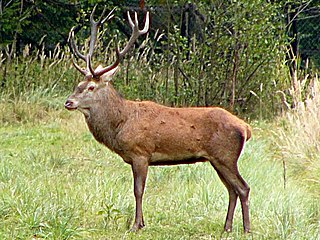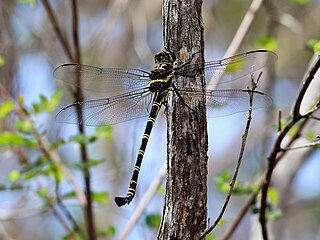
Aeshna isoceles is a small hawker dragonfly that is found in Europe, mostly around the Mediterranean, and the lowlands of North Africa. Its common name in English is green-eyed hawker. In Britain it is a rare and local species and is known as the Norfolk hawker. It has a brown colour with green eyes and clear wings and also a yellow triangular mark on the second abdominal segment which gave rise to its scientific name. It used to be in the genus Anaciaeschna as it has several differences from the other members of the genus Aeshna. Its specific name is often spelt isosceles.

The red-veined darter or nomad is a dragonfly of the genus Sympetrum.

Red-cheeked squirrels are species of squirrels in the genus Dremomys in the subfamily Callosciurinae. The six species which are all found only in Asia are listed as "Least Concern" by the IUCN.

The giant Hawaiian darner, also known as the giant Hawaiian dragonfly or pinao, is a species of dragonfly in the family Aeshnidae. It is one of two species of dragonfly that is endemic to the Hawaiian Islands. It is found near streams and wetlands on all islands of the archipelago and it has a wide altitude range, but is particularly common at higher elevations.

Orthetrum is a large genus of dragonflies in the Libellulidae family. They are commonly referred to as skimmers.

Cervus is a genus of deer that primarily are native to Eurasia, although one species occurs in northern Africa and another in North America. In addition to the species presently placed in this genus, it has included a whole range of other species now commonly placed in other genera. Additionally, the species-level taxonomy is in a state of flux.

Somatochlora, or the striped emeralds, is a genus of dragonflies in the family Corduliidae with 42 described species found across the Northern Hemisphere.

Petalura ingentissima, the giant petaltail, has been described as the world's largest dragonfly, with a wingspan of 160 mm. It is found in Queensland, Australia.

The Chinese mole shrew is one of four species of Asian mole shrew in the genus Anourosorex.

Brachythemis is a genus of dragonflies in the family Libellulidae. They are commonly known as groundlings.

Gomphidia is a genus of dragonfly in the family Gomphidae. It contains the following species:

Hemiphlebia mirabilis, commonly known as the ancient greenling, is a species of damselfly, the only living species of the genus Hemiphlebia and the family Hemiphlebiidae. It is very small with a long, metallic-green body and clear wings. It is endemic to south-eastern Australia. Its natural swamp habitat is threatened by habitat loss. The oldest representatives of the family date to the Late Jurassic.

Macromia is a genus of large dragonflies in the family Macromiidae. Species of the genus Macromia are commonly known as river cruisers from their habit of cruising long distances along river banks. Most species occur in the tropical Australasian region, with one species being found in Europe , and a few species occurring in North America.

Tramea is a genus of dragonflies in the family Libellulidae, the skimmers and perchers. Species of Tramea are found in tropical and subtropical regions around the globe. They typically have colored bases to their otherwise translucent hindwings. In particular when they fly, this creates the impression of their carrying bags at the start of their abdomens. They are known commonly as saddlebags or saddlebags gliders.

Sieboldius is a genus of dragonflies in the family Gomphidae. The genus occurs in Asia and is closely related to the dragonhunter of North America.
Philoganga is a genus of damselflies, the only genus in the family Philogangidae.

Potamarcha congener is also known as the yellow-tailed ashy skimmer, common chaser, or swampwatcher. It is a species of dragonfly in the family Libellulidae, and was first described by Jules Pierre Rambur in 1842, almost fifty years before Friedrich Karsch described its genus. Potamarcha congener is one of two species making up the genus Potamarcha, together with Potamarcha puella.

Uropetala chiltoni is a giant dragonfly in the family Petaluridae, endemic to New Zealand. The Māori name for giant dragonflies, kapokapowai, means "water snatcher", alluding to the water-dwelling juvenile stage (nymph), which, like all dragonflies, has a long extendable jaw that shoots out to snatch prey.
Somatochlora dido is a species of dragonfly in the family Corduliidae. It is known from southeastern China and northern Vietnam, but populations in Vietnam may alternatively represent a separate, undescribed, species. S. dido has sometimes been treated as synonymous with S. taiwana from Taiwan, but more recent publications have treated them as separate species. S. shennong is also closely related.

Rhyothemis fuliginosa, also known as the butterfly dragonfly or the butterfly flutterer, is a species of dragonfly of the family Libellulidae found throughout East Asia, in the countries of Japan, China, Taiwan, and the Korean Peninsula.


















